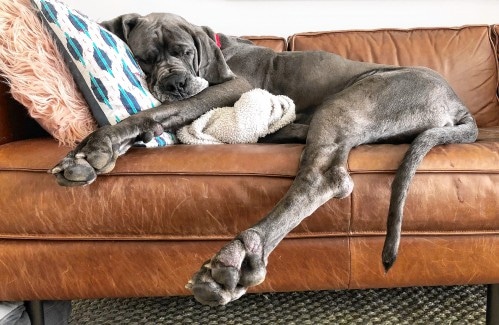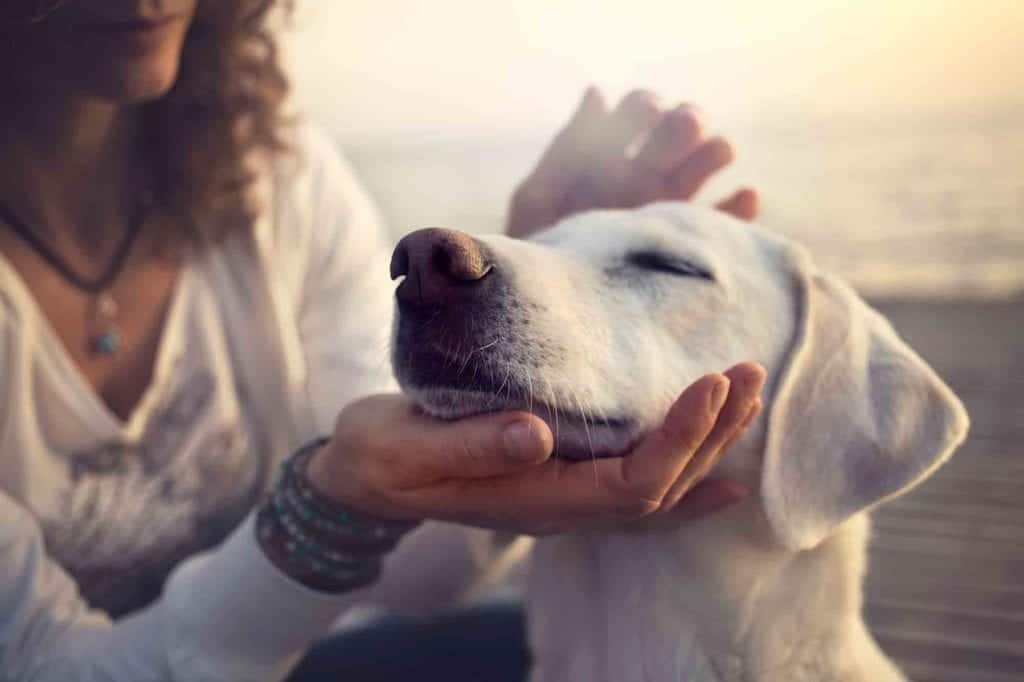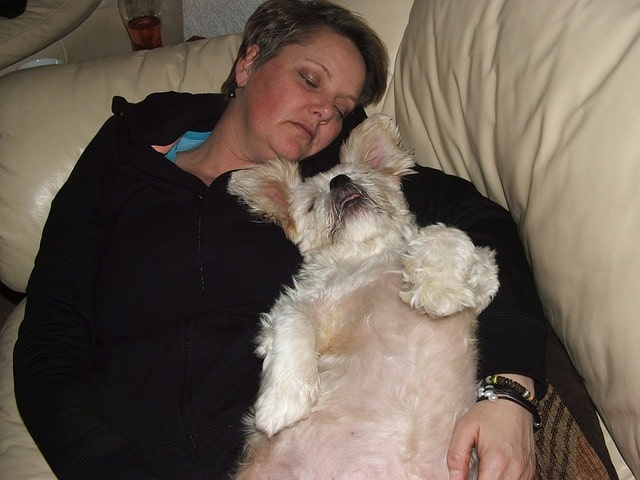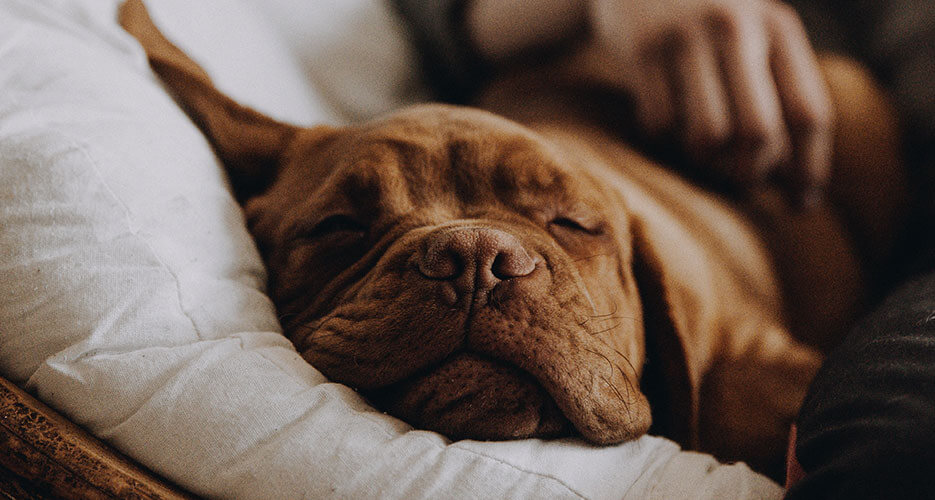You have been a proud parent to a beautiful furry baby for a couple of years now.
Your dog has always slept like a log but just recently, he started snoring in his sleep.
At first, you thought it was just something that was blocking his airway and it would go away but alas, the snoring keeps on persisting!
You are left wondering if the snoring is a result of a health issue that needs medical attention or maybe your dog is just getting old.
But Do Dogs Snore As They Get Older?

The short answer is: Yes, dogs can snore more as they age.
Just like humans, dogs’ bodies change as they get older and this can lead to an increase in snoring.
There are a couple of explanations as to why this happens.
Let’s have a look at them below:
I. Loss Of Muscle Tone In The Throat And Soft Palate.
As your dog ages, his muscles can become weaker, which can lead to the relaxation of tissues in the throat.
This can partially obstruct the airway and cause snoring.
Also, aging will almost always cause wear and tear on a dog’s throat muscles and respiratory system, leading to the vibrations that are associated with snoring.
II. Obesity
As dogs age, they may become less active and their metabolism significantly slows down.
The hormone levels will change with age which will also affect their metabolism.
This can lead to weight gain, especially if they do not exercise enough and are fed the same amount of food as they were when they were younger.
The extra weight gained can put more pressure on the airways and this can cause snoring.
III. Sickness
As your dog gets older, he will be prone to some conditions, such as hypothyroidism and Cushing’s disease.
These conditions can cause a decrease in metabolism and an increase in appetite leading to weight gain.
Certain medications, such as steroids, can also lead to weight gain in older dogs and once your dog gains weight, he could start snoring.
Other Reasons Why Dogs Snore

While it is true that age will most likely make your dog begin to snore, there are still other causes of snoring that you may want to consider.
These include:
A. Blocked Nasal Passage
When the nasal passages are blocked, it can make it more difficult for air to flow freely through the nose and into the lungs.
This can cause the tissues in the throat to vibrate and create the sound of snoring.
There are several reasons why a dog’s nasal passages may become blocked.
Some common causes include upper respiratory infections such as colds or sinus infections, allergies, or even anatomical issues such as a deviated septum or a tumor.
B. Sleep Apnea
Sleep apnea is a condition that causes the airway to become partially or completely blocked during sleep, leading to a temporary cessation of breathing.
This can cause the dog to snore loudly as they try to breathe.
Obesity is the most common cause of sleep apnea but other causes include abnormalities in the throat or tongue, and certain medical conditions, such as hypothyroidism.
C. Allergies
Allergies occur when the immune system reacts to a foreign substance, such as pollen or dust as if it were harmful.
This can cause a range of symptoms, including sneezing, coughing, and nasal congestion.
If a dog has allergies, the nasal passages may become swollen and inflamed.
This can make it more difficult for air to flow freely through the nose and into the lungs.
As a result, the tissues in the throat may vibrate and create the sound of snoring as the dog tries to breathe.
Several types of allergies can affect dogs, including environmental allergies, food allergies, and skin allergies.
Related: Protein Allergy in Dogs: What Every New Dog Parent Must Know
Should I Worry About My Old Dog Snoring?

If your old dog starts snoring, there is probably no reason to worry.
As we have seen, snoring is often associated with aging in most dogs.
That said, you may want to look for some additional tell-tale signs of something wrong.
For instance, if the snoring is accompanied by other symptoms, such as difficulty breathing, coughing, or lethargy, then there is a chance the dog has an underlying condition such as sleep apnea or some other respiratory problems.
In such a case, it is best to consult a vet.
But if your old dog is snoring but does not have any other symptoms, it may be due to age-related changes in their body, so you really don’t need to be worried.
Why Do Older Dogs Snore When Awake?
It is common for dogs to snore in their sleep but if you hear your dog snoring while awake, you may want to have him checked by a vet because there is a good chance your dog has severe loss of muscle tone in the throat, pharynx, larynx, or soft palate.
The vet will examine the dog to localize the problem and thereby recommend a solution.
Additionally, Brachycephalic breeds, such as Bulldogs and Pugs, have short noses and narrow airways which can make them more prone to snoring and that may also be a possible explanation for why your dog snores when awake.
Check out this post for a quick overview of dog breeds that are predisposed to snoring: Top 12 Snoring Dog Breeds
How Do You Stop An Old Dog From Snoring?

If your old dog is snoring and it is causing you or your dog discomfort, there are a few things you can try to stop the snoring.
The first thing to do is identify any underlying causes of the snoring and address them.
This may include helping your dog lose weight if they are obese, providing them with muscle-strengthening exercises if their snoring is due to muscle weakness in the throat, or treating any underlying health issues such as allergies or sleep apnea.
You can also try using a humidifier to help alleviate your old dog’s snoring.
Dry air can irritate the airways and contribute to snoring.
By using a humidifier, you can help to keep the air moist and reduce irritation in the throat.
It’s also important to keep your old dog’s sleeping environment clean and free of irritants. This can help to prevent snoring caused by allergies or other respiratory issues.
In addition, you can try positioning your old dog in a more upright position while they sleep. This can help to keep the airway open and reduce snoring.
Parting Thoughts
If your dog has never had a snoring problem and then suddenly starts snoring, you may want to watch them closely to know the reason.
Ask yourself these questions:
- Has my dog gained weight?
- Does he exercise enough?
- Are there any symptoms of a disease?
Answering these questions will help you know whether it is just normal breathing or if you need to see a vet.
As an Amazon Associate, we may receive a small commission from qualifying purchases but at no extra cost to you. Learn more. Amazon and the Amazon logo are trademarks of Amazon.com, Inc, or its affiliates.

